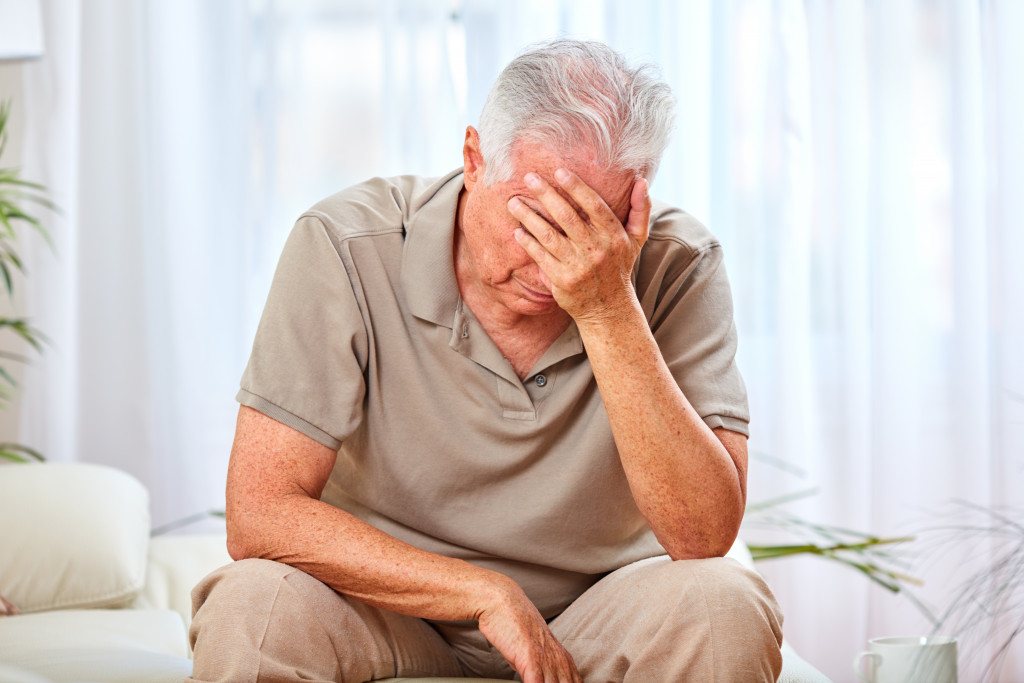Seniors aging in place often live alone. They have no one they can rely on in case they need assistance tackling certain tasks. Some only need help to remind them to drink their medications or drive them to doctor’s appointments.
Others require more specialized services like rehabilitation. They are now suffering certain conditions that render them unable to walk or communicate effectively on their own. Thankfully, certain professionals can help seniors live a happy life while aging in place.
Depression in Older Adults
It is true that depression is a common type of mood disorder. It is normal for anyone to feel occasional feelings of sadness and blue. However, this is not normal in aging.
Late-life depression often occurs with other medical disabilities and illnesses. Depression associated with seniors often lasts longer. This makes it harder for seniors to rehabilitate and enjoy their remaining senior years.
Many things can put seniors at risk for geriatric depression. These include the following factors:
- Being female
- Experiencing stressful life events like deaths of loved ones
- Not having enough social support
- Being single, divorced, widowed, or unmarried
- Drinking certain prescription medication or a combination of medicines
- Disability
- Poor self-image
- Lack of dependence
- Social isolation
- Having a medical or family history of depression
- Substance abuse
- Previous suicide attempts
- Illnesses/having chronic or severe pain
- Fear of death
Signs a Senior Loved One May Have Late-life Depression
How seniors present depression can be different from how regular people show they are depressed. The following shows some signs of geriatric depression.
- Loss of concentration
- Confusion
- Impaired judgment
- Loss of memory (short or long-term)
- Poor motor coordination
- Significant weight loss
- Decrease or increase in appetite
- Loss of interest in their hobbies
- Inappropriate feelings of guilt
- Sleeping too much/Insomnia
How Seniors Aging in Place Can Fight Geriatric Depression

Seniors often do not want others, especially their loved ones, to know that they are already suffering from late-life depression. This is why they tend to withdraw from their loved ones. It is important that seniors find the help they need to ensure they don’t fall into depression as they age in place.
To better manage geriatric depression, here are some tips worth keeping in mind.
Build Your Own Social Support Network
Just because you are living alone no longer means you should be content being on your own. Know that you still have loved ones who care for you despite them living miles and miles away. So, don’t hesitate to reach out to them, invite them over, and visit if you can still travel.
It also helps you invest in home nursing care services if you now need a professional to help you recover from a certain illness or surgery. This will help ensure you can recover faster so you can start living on your own again. Their help and company will give you more reasons to believe that you are never alone, even if your loved ones are far away.
It also makes sense that you talk to a professional who can help diagnose if what you are experiencing is indeed geriatric depression. There should be no shame in asking for help from such professionals. Know that they can provide you with the best support to help you tackle and manage your symptoms.
Find Yourself a New Sense of Purpose
In your younger years, you might think that your purpose is to raise healthy and well-adjusted kids, find a career you are good at, or both. Now that you are in your senior years, your lack of a sense of purpose could be fueling your depressive state.
Remember that there is no reason for you to let your age stop you from living life with a purpose. You can start by taking up a new hobby that will give you more reasons to get up each day. This could be a new sport, knitting, gardening, or even adopting a new pet you can focus your time on.
Stay Active
You could be eating healthily and sleeping soundly most nights. But are you doing everything you can to keep yourself active? Remember that exercise is one good way to fight depression from ruining your day.
Dedicate enough time to exercise each day. Insert physical activity no matter how busy your days are. There are age-appropriate workouts seniors can safely try, no matter their age or condition.
We need to stop thinking that depression is only normal in seniors. This is a common condition but never a normal part of aging. The earlier you recognize symptoms of late-life depression, the easier it will be to find the right support so you can start living a more fulfilling life in your senior years.

